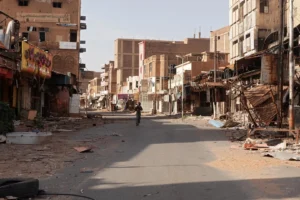Analysts are concerned that the absence of the grain deal will threaten food security in low-income nations in the Middle East and Africa, urging the West to offer Russia the necessary guarantees to maintain a crucial food supply chain.
Turkish President Recep Tayyip Erdogan’s meeting with his Russian counterpart Vladimir Putin on Monday failed to yield a breakthrough in the revival of the Black Sea Grain Initiative, according to experts.
Following the meeting, Erdogan expressed optimism about the initiative, but concrete evidence of a breakthrough remains elusive. Meanwhile, Putin reiterated accusations against the West for failing to meet its obligations under the agreement.
Analysts are concerned that the absence of the grain deal will threaten food security in low-income nations in the Middle East and Africa, urging the West to offer Russia the necessary guarantees to maintain a crucial food supply chain.
REVIVING GRAIN DEAL UPHILL BATTLE
“Persuading Russia to engage in a second grain deal is an uphill battle … To secure a deal, Erdogan must redouble his efforts,” said Serkan Demirtas, a foreign policy analyst based in Ankara, Türkiye’s capital.
The Turkish leader noted that Russia’s concerns should be addressed, adding that Türkiye and the United Nations (UN) had collaborated on a new package of suggestions to address Russia’s concerns.
Erdogan also called on Ukraine to adopt a more flexible position in negotiations with Russia regarding the revival of the deal and consider exporting more grain to Africa rather than Europe.
However, Putin maintained that the revival of the UN-brokered deal hinges on whether the West can meet Moscow’s demands related to agricultural exports and other issues.
Putin also emphasized the importance of keeping the Black Sea corridor free from military activities as a condition for a potential return to the agreement.
Despite acknowledging the deal’s significance, Western nations remain hesitant to make concessions to Moscow. The United States and the European Union have dismissed Moscow’s complaints as lacking merit, asserting that their sanctions do not target Russian grain or fertilizers.
German Foreign Minister Annalena Baerbock criticized on Monday Putin’s decision to block the Black Sea grain deal, accusing him of playing “cynical” games.
However, analysts argue that the developed countries failed to recognize the situation’s urgency as the developing countries in the Middle East and Africa do.
“The U.S. and NATO economic embargo decisions not only harmed Russia but also caused significant financial losses to many countries worldwide, especially in Africa and the Arab countries,” said Kamal Ben Younes, the director of Ibn Rushd Foundation for Arab and African Studies in Tunisia.
“It is in the interest of Tunisia, African countries, and all countries worldwide to exert pressure on the deal talks to control the prices of such essential commodities,” added the Tunisian scholar.
While Türkiye and the UN are having difficulty bringing the relevant parties together, recent reports have hinted at a potential new role for Qatar in finding a new way to export both Russian and Ukrainian grains.
“There is no doubt that Qatar, leveraging its soft power and growing regional and international presence, aims to address a global crisis and food dilemma that could threaten the food security of many impoverished and low-income countries, especially in Africa and the Middle East,” said Kheir Diabat, a professor from the International Affairs Department of Qatar University.
THREAT FOR LOW-INCOME NATIONS
The failure to resurrect the Black Sea grain deal could have far-reaching consequences on low-income countries in the Middle East and Africa, which heavily rely on Ukrainian and Russian grain exports.
Before its suspension, the original deal facilitated the export of nearly 33 million tonnes of grain from Ukraine to global markets, benefiting developing countries, particularly in the Middle East and Africa.
Russia’s withdrawal from the agreement in July had already impacted global grain prices, raising concerns about food security and a potential worldwide food crisis.
Egypt, one of the world’s largest wheat importers, felt the repercussions of Russia’s departure, with rising prices affecting its food supply.
“Egypt largely relies on grain imports from these warring countries, as 80 percent of its wheat imports come from Russia and Ukraine,” said Al-Bahi Heikal, an Egyptian agricultural engineer.
He added that the increase in grain prices has strained Egypt’s limited foreign currency reserves, preventing the most populous Arab country from importing fertilizers, seeds, agricultural tools and machinery necessary for expanding its agricultural lands.
Younes also said the Western sanctions on Russia “caused the increase of the trade deficit and the state budget deficit in Tunisia due to soaring global grain and fuel prices.”
“The ban does not stop at depriving Tunisia of obtaining Russian and Ukrainian grain at a reasonable price but also suspending tourist income that was provided by Russian tourists to Tunisia every year,” Younes added.
While the grain deal doesn’t directly impact Gulf countries like Qatar, oil-rich countries in the region heavily rely on grain imports, rendering them susceptible to global price fluctuations, regardless of the Black Sea supply.
“Boosting strategic grain reserves and increasing domestic food production is key to strengthening Qatar and other Middle Eastern nations’ long-term food security,” said Steven Wright, associate professor of International Relations at the College of Humanities and Soci
Turkish President Recep Tayyip Erdogan’s meeting with his Russian counterpart Vladimir Putin on Monday failed to yield a breakthrough in the revival of the Black Sea Grain Initiative, according to experts.
Following the meeting, Erdogan expressed optimism about the initiative, but concrete evidence of a breakthrough remains elusive. Meanwhile, Putin reiterated accusations against the West for failing to meet its obligations under the agreement.
Analysts are concerned that the absence of the grain deal will threaten food security in low-income nations in the Middle East and Africa, urging the West to offer Russia the necessary guarantees to maintain a crucial food supply chain.
REVIVING GRAIN DEAL UPHILL BATTLE
“Persuading Russia to engage in a second grain deal is an uphill battle … To secure a deal, Erdogan must redouble his efforts,” said Serkan Demirtas, a foreign policy analyst based in Ankara, Türkiye’s capital.
The Turkish leader noted that Russia’s concerns should be addressed, adding that Türkiye and the United Nations (UN) had collaborated on a new package of suggestions to address Russia’s concerns.
Erdogan also called on Ukraine to adopt a more flexible position in negotiations with Russia regarding the revival of the deal and consider exporting more grain to Africa rather than Europe.
However, Putin maintained that the revival of the UN-brokered deal hinges on whether the West can meet Moscow’s demands related to agricultural exports and other issues.
Putin also emphasized the importance of keeping the Black Sea corridor free from military activities as a condition for a potential return to the agreement.
Despite acknowledging the deal’s significance, Western nations remain hesitant to make concessions to Moscow. The United States and the European Union have dismissed Moscow’s complaints as lacking merit, asserting that their sanctions do not target Russian grain or fertilizers.
German Foreign Minister Annalena Baerbock criticized on Monday Putin’s decision to block the Black Sea grain deal, accusing him of playing “cynical” games.
However, analysts argue that the developed countries failed to recognize the situation’s urgency as the developing countries in the Middle East and Africa do.
“The U.S. and NATO economic embargo decisions not only harmed Russia but also caused significant financial losses to many countries worldwide, especially in Africa and the Arab countries,” said Kamal Ben Younes, the director of Ibn Rushd Foundation for Arab and African Studies in Tunisia.
“It is in the interest of Tunisia, African countries, and all countries worldwide to exert pressure on the deal talks to control the prices of such essential commodities,” added the Tunisian scholar.
While Türkiye and the UN are having difficulty bringing the relevant parties together, recent reports have hinted at a potential new role for Qatar in finding a new way to export both Russian and Ukrainian grains.
“There is no doubt that Qatar, leveraging its soft power and growing regional and international presence, aims to address a global crisis and food dilemma that could threaten the food security of many impoverished and low-income countries, especially in Africa and the Middle East,” said Kheir Diabat, a professor from the International Affairs Department of Qatar University.
THREAT FOR LOW-INCOME NATIONS
The failure to resurrect the Black Sea grain deal could have far-reaching consequences on low-income countries in the Middle East and Africa, which heavily rely on Ukrainian and Russian grain exports.
Before its suspension, the original deal facilitated the export of nearly 33 million tonnes of grain from Ukraine to global markets, benefiting developing countries, particularly in the Middle East and Africa.
Russia’s withdrawal from the agreement in July had already impacted global grain prices, raising concerns about food security and a potential worldwide food crisis.
Egypt, one of the world’s largest wheat importers, felt the repercussions of Russia’s departure, with rising prices affecting its food supply.
“Egypt largely relies on grain imports from these warring countries, as 80 percent of its wheat imports come from Russia and Ukraine,” said Al-Bahi Heikal, an Egyptian agricultural engineer.
He added that the increase in grain prices has strained Egypt’s limited foreign currency reserves, preventing the most populous Arab country from importing fertilizers, seeds, agricultural tools and machinery necessary for expanding its agricultural lands.
Younes also said the Western sanctions on Russia “caused the increase of the trade deficit and the state budget deficit in Tunisia due to soaring global grain and fuel prices.”
“The ban does not stop at depriving Tunisia of obtaining Russian and Ukrainian grain at a reasonable price but also suspending tourist income that was provided by Russian tourists to Tunisia every year,” Younes added.
While the grain deal doesn’t directly impact Gulf countries like Qatar, oil-rich countries in the region heavily rely on grain imports, rendering them susceptible to global price fluctuations, regardless of the Black Sea supply.
“Boosting strategic grain reserves and increasing domestic food production is key to strengthening Qatar and other Middle Eastern nations’ long-term food security,” said Steven Wright, associate professor of International Relations at the College of Humanities and Social Sciences of Hamad Bin Khalifa University, Qatar.
al Sciences of Hamad Bin Khalifa University, Qatar.
Source: slguardian











Add Comment